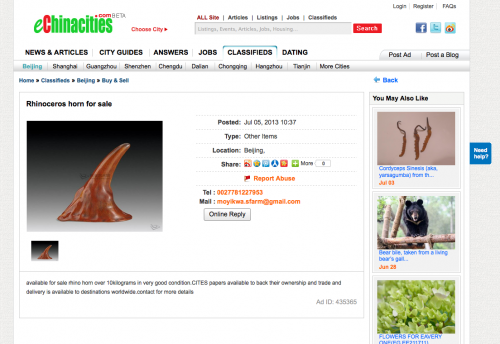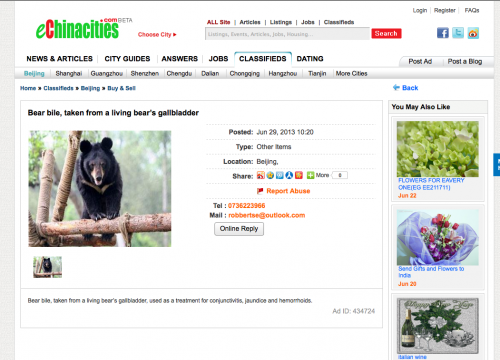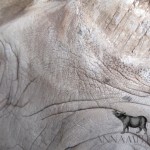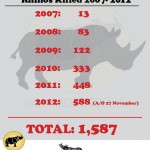
Update 06/07/2013: eChinacities.com has removed the advertisements.
In the eChinacities.com classified section of its website, the following advertisement is posted: “Over 10 kilograms of rhinoceros horn in very good condition”. Another listing offers “Bear bile, taken from a living bear’s gallbladder”.
Despite a growing number of polite tweets (@eChinacities is an active Twitter account) requesting that eChinacities.com remove the content from its website, there has been no response from eChinacities.com and the advertisements remain as of this writing.

The real-time public forum of social media, such as Twitter, provides eChinacities.com the opportunity to quickly respond and remove the content (or alternatively, explain why the content will not be removed).
We understand that these types of advertisements are user-generated and it is unlikely that the editors posted the ads themselves. Specific policies addressing illegal activity, such as utilizing the website’s classified section to sell rhino horn, are not clearly posted on the website (although eChinacities.com declares in its Privacy Policy “eChinacities.com is not responsible for the re-sending, forum posting, or other distribution of the contents in its jobs and classifieds sections”). eChinacities.com describes itself as “an English-language website that provides a comprehensive range of services and information for both international visitors and China-based expats”.
It is interesting to note that a blogger for the site wrote the following in an article about the use of endangered species in traditional Chinese medicine: “Even among practitioners, the use of endangered animal parts is controversial but most would agree that alternatives exist. As a medical system emphasizing the body’s oneness with nature, practitioners have a moral obligation to assist conservation efforts by actively seeking out and prescribing alternatives.”
We urge eChinacities.com to take responsibility for its classified advertisement content and remove the listings for rhino horn and bear bile from its website immediately.
Editor’s note: Approximately 10 hours after posting this blog entry, the rhino horn and bear bile advertisements were still online, so I followed up the tweets with an email to cs (at) eChinacities (dot) com requesting that the content be removed.




